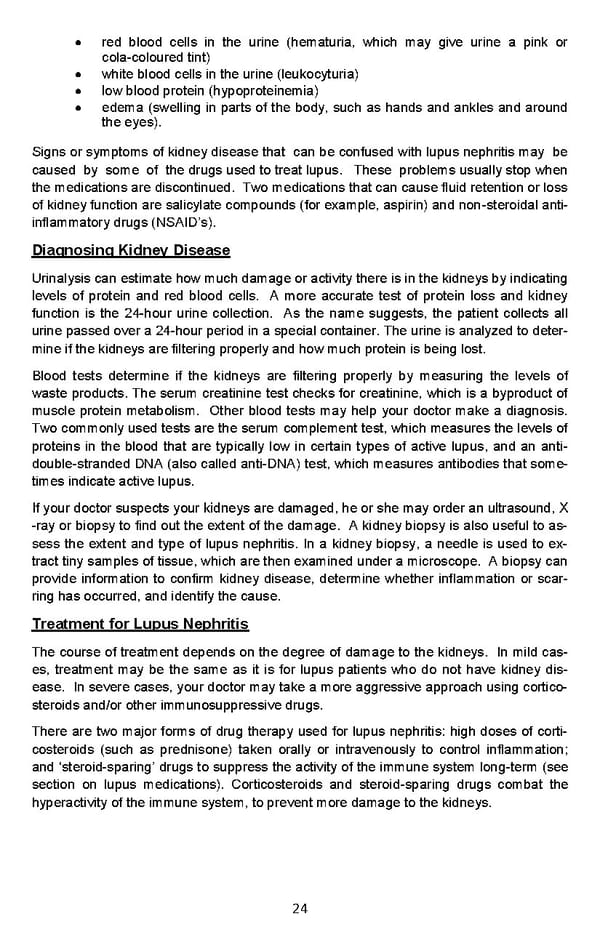• red blood cells in the urine (hematuria, which may give urine a pink or cola-coloured tint) • white blood cells in the urine (leukocyturia) • low blood protein (hypoproteinemia) • edema (swelling in parts of the body, such as hands and ankles and around the eyes). Signs or symptoms of kidney disease that can be confused with lupus nephritis may be caused by some of the drugs used to treat lupus. These problems usually stop when the medications are discontinued. Two medications that can cause fluid retention or loss of kidney function are salicylate compounds (for example, aspirin) and non-steroidal anti- inflammatory drugs (NSAID’s). Diagnosing Kidney Disease Urinalysis can estimate how much damage or activity there is in the kidneys by indicating levels of protein and red blood cells. A more accurate test of protein loss and kidney function is the 24-hour urine collection. As the name suggests, the patient collects all urine passed over a 24-hour period in a special container. The urine is analyzed to deter- mine if the kidneys are filtering properly and how much protein is being lost. Blood tests determine if the kidneys are filtering properly by measuring the levels of waste products. The serum creatinine test checks for creatinine, which is a byproduct of muscle protein metabolism. Other blood tests may help your doctor make a diagnosis. Two commonly used tests are the serum complement test, which measures the levels of proteins in the blood that are typically low in certain types of active lupus, and an anti- double-stranded DNA (also called anti-DNA) test, which measures antibodies that some- times indicate active lupus. If your doctor suspects your kidneys are damaged, he or she may order an ultrasound, X -ray or biopsy to find out the extent of the damage. A kidney biopsy is also useful to as- sess the extent and type of lupus nephritis. In a kidney biopsy, a needle is used to ex- tract tiny samples of tissue, which are then examined under a microscope. A biopsy can provide information to confirm kidney disease, determine whether inflammation or scar- ring has occurred, and identify the cause. Treatment for Lupus Nephritis The course of treatment depends on the degree of damage to the kidneys. In mild cas- es, treatment may be the same as it is for lupus patients who do not have kidney dis- ease. In severe cases, your doctor may take a more aggressive approach using cortico- steroids and/or other immunosuppressive drugs. There are two major forms of drug therapy used for lupus nephritis: high doses of corti- costeroids (such as prednisone) taken orally or intravenously to control inflammation; and ‘steroid-sparing’ drugs to suppress the activity of the immune system long-term (see section on lupus medications). Corticosteroids and steroid-sparing drugs combat the hyperactivity of the immune system, to prevent more damage to the kidneys. 24
 Living Well With Lupus Facts Booklet Page 23 Page 25
Living Well With Lupus Facts Booklet Page 23 Page 25